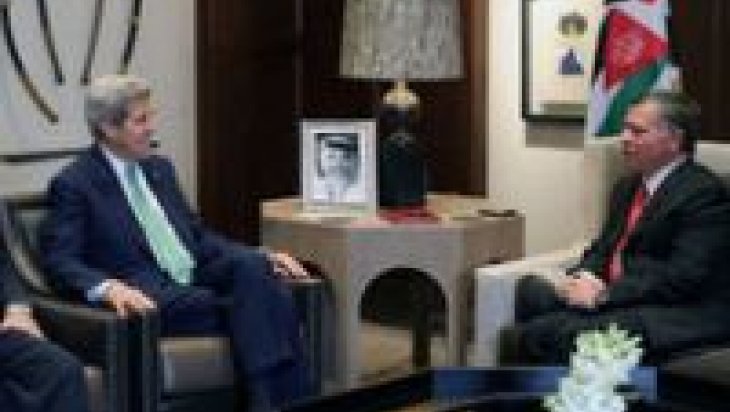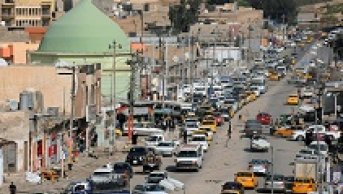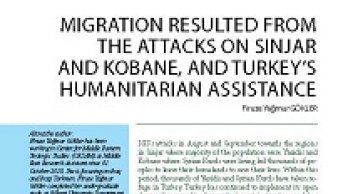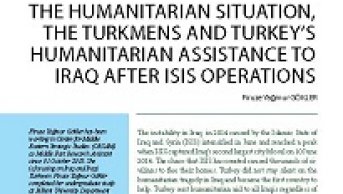The Israeli-Palestinian Peace Talks Mediated By Kerry, and Kerry's Visits To Jordan and Saudi Arabia

The U.S. Secretary of State John Kerry paid a visit to the Middle East for the tenth time on the occasion of the Israeli – Palestinian peace negotiations last week. During his visit, Kerry talked to Jordan's King and Saudi Arabia's King to seek support in order to solve the conflicts between Israel and Palestine. Kerry visited Jordan's King Abdullah in the first place, and then he visited Saudi Arabia's King.
Direct negotiations between Israel and Palestine started with the initiatives of the U.S. Secretary of State John Kerry on July 29, 2013. Thus, the peace process between the two countries was relaunched with Kerry's initiative. A nine-month period negotiation process which expires in April 2014 was set to reach a final decision in the conflict between Israel and Palestine. Before the negotiations, all 104 Palestinian prisoners who had been taken captive since before the 1993 Oslo I Agreement were released by Israel. Afterwards, the peace talks between the two countries began under the leadership of the U.S. Secretary of State John Kerry in Washington. There are important points that must be solved between the two countries, as well as the problems that still exist after the beginning of peace negotiations. How to define the borderline between the two countries depending on which points; recognition of Palestine as an independent state; the status of Jerusalem; ongoing construction of the Israeli settlements in the West Bank are the problems that are expected and needed to be solved between the two parties.
During the first day of the negotiations, Mahmoud Abbas stated that they do not want presence of Israeli civilians or military troops in their borders. Which Israeli authorities considered a discrimination against Jews. In the following talks, Abbas said that what he meant was the Israelis in favor of the occupation, and it was not a problem for Israelis or Jews to come to Palestine for tourism or business as long as they were not occupation forces. Israeli Prime Minister Benjamin Netanyahu stated that they refused to recognize the Palestinian right of return, and that Jerusalem shall not be divided. Besides, Israeli negotiators said they would not get a state based on 1967 borders, and that Separation Wall would be a border.
Kerry met with Jordan's King and Saudi Arabia's King to talk on the Israeli-Palestinian peace process and to solve the disputes between Israel and Palestine. Firstly talking to Jordan's King Abdullah, Kerry received support from the King on the issue. Jordan's King reiterated that they would support the peace efforts to solve or bring an end to the Israeli-Palestinian conflict. King Abdullah underlined that there should be an equitable solution to the problem between the two countries. Jordan's King also expressed their support for Kerry's mediation efforts in the peace talks between Israel and Palestine. Kerry, on the other hand, promised Jordan's King that equitable and equal solutions will be found to solve the problems between the two countries.
Kerry paid a visit to Saudi Arabia after his visit to Jordan, and here he talked to Saudi Arabia's King Abdullah and Saudi Arabia's Foreign Minister Prince Saud al-Faisal. Like Jordan's King, also King Abdullah expressed their support for Kerry's efforts in Israeli-Palestinian peace negotiations. During the talk held with Kerry on the Israeli-Palestinian conflict, Foreign Minister Prince al-Faisal said they agreed on “commitment to achieve a comprehensive, just and lasting peace based on the international decisions and legitimacy, the return of territory in exchange for peace, and the Arab peace initiative”. Kerry asserted that he believed the support from these two countries will play a significant role in peace talks, and change course of the talks in a positive way.
The support from countries in the regions is of importance in Israeli-Palestinian peace talks, but Israel and Palestine are the major actors in this process. Considering Israel's recent policies on Palestine, it might be suggested that the peace talks will be halted and the process will take a long time.











